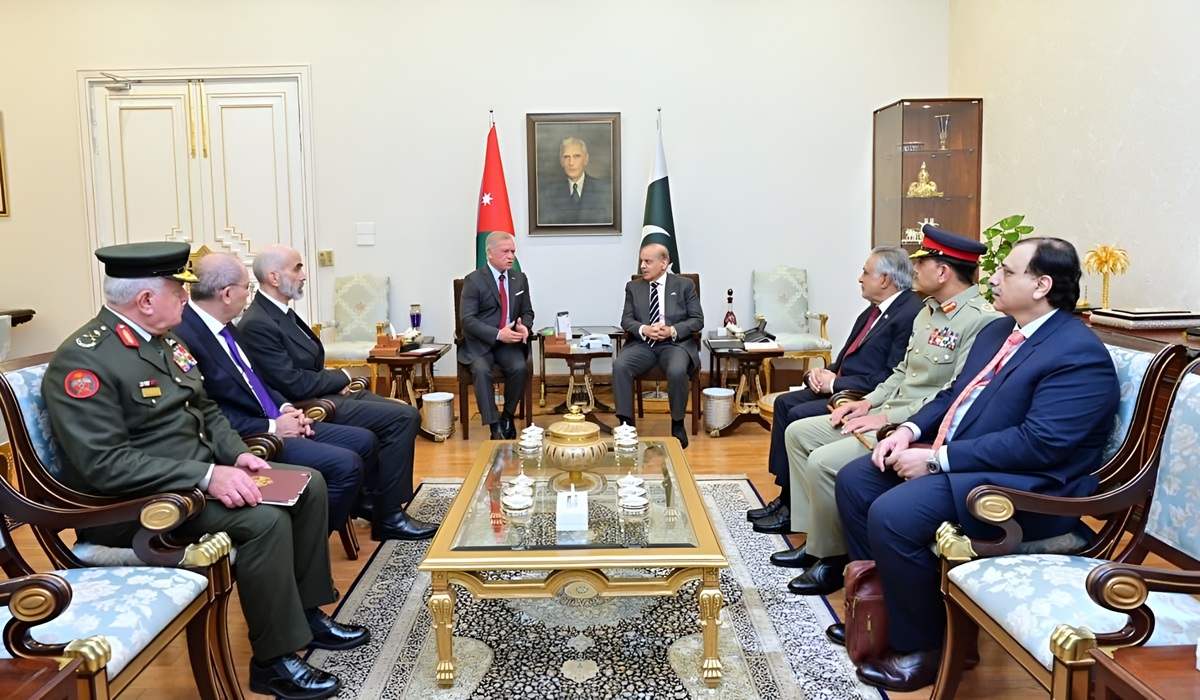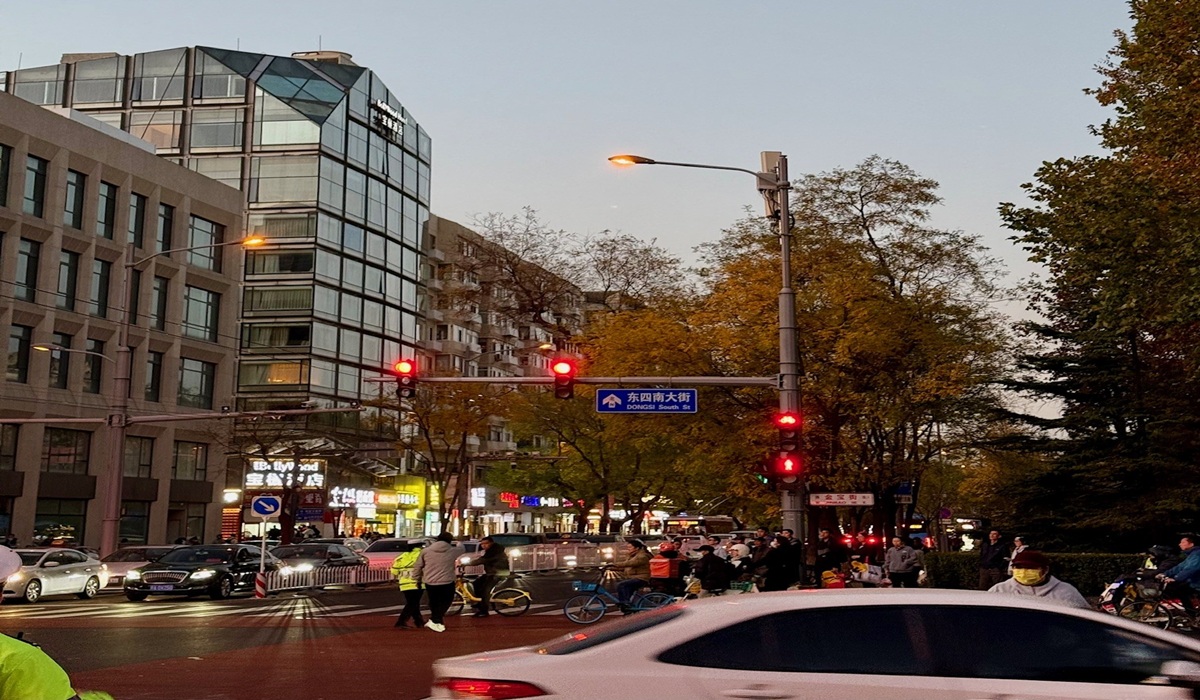King Abdullah II’s Visit to Pakistan — Carving New Pathways
- Bakhtawar Naveed
- South Asia
- Trending News
- November 17, 2025

The recent visit of King Abdullah II of Jordan to Pakistan has emerged as one of the most significant diplomatic events in recent years. The unprecedented reception he received at the Nur Khan Air Base — where both Prime Minister Shehbaz Sharif and President Asif Ali Zardari personally welcomed him — was far beyond ceremonial protocol. In Pakistan’s diplomatic tradition, such an extraordinary welcome is reserved only for leaders whose visit carries profound strategic importance.
This visit comes at a time when the Middle East is engulfed in unprecedented turmoil. The humanitarian crisis in Palestine has intensified, regional alliances are shifting rapidly, and global power dynamics are undergoing major transformation. In such a context, King Abdullah’s arrival in Pakistan is far from symbolic; it carries deep political, diplomatic, and regional implications that may influence the broader Muslim world.
The Middle East is undergoing one of the most challenging phases in its modern history. Israel’s aggressive policies, the devastation in Gaza, the heightened polarization among regional powers, and the recalibration of U.S.–China rivalry have created an environment of extreme volatility. In this volatile landscape, moderate Muslim states such as Pakistan and Jordan find it increasingly essential to synchronize their strategic thinking.
Jordan is uniquely vulnerable to any escalation in Palestine. Millions of Jordanians are of Palestinian descent, and the Hashemite Kingdom retains custodianship over the holy sites in Jerusalem. Any shift in Jerusalem’s status or new Israeli aggression directly impacts Jordan’s internal stability. Pakistan, on the other hand, has consistently upheld a principled position on Palestine — supporting the creation of an independent Palestinian state, opposing Israeli occupation, and calling for protection of Al-Aqsa Mosque and other sacred sites.
In this backdrop, King Abdullah’s visit was not an isolated diplomatic gesture but a coordinated step to rejuvenate a joint diplomatic voice on Palestine and wider regional issues.
Pakistan and Jordan have enjoyed a stable and mutually respectful relationship for decades. Pakistan has played a vital role in training Jordanian armed forces, while intelligence cooperation between the two countries has been instrumental in combating terrorism and enhancing regional security. Their military-to-military interactions — from joint exercises to strategic consultations — have created a solid foundation for long-term cooperation.
Today, as Afghanistan experiences renewed instability, extremist networks regain momentum, and proxy conflicts spread across the region, Pakistan and Jordan find themselves confronting similar security challenges. Their collaboration is not only desirable; it is strategically indispensable.
The VVIP reception accorded to King Abdullah II carried four distinct messages for the region and beyond: the presence of both the president and the prime minister symbolized political harmony and conveyed that Pakistan’s leadership stands united on key foreign policy matters, respect for the Custodian of Jerusalem’s Holy Sites. As the recognized guardian of Islamic holy sites in Jerusalem, King Abdullah holds a unique spiritual and political status within the Muslim world. Pakistan’s warm reception acknowledged this role with deep respect. Islamabad maintains a careful equilibrium in its Middle East relations — avoiding entanglements in rival blocs and prioritizing dialogue, stability, and de-escalation. Welcoming King Abdullah reinforced Pakistan’s commitment to moderate diplomacy. Both countries share grave concerns over the ongoing humanitarian tragedy in Palestine and the rising threat of regional escalation. This visit underscored their collective resolve to strengthen their voice on the global stage.
While the Israeli assault on Palestinians was undoubtedly the main catalyst behind the visit, several additional strategic factors are equally relevant: emerging terrorism threats from Afghanistan, the growing spread of proxy warfare across the Middle East, expanding defense-industrial cooperation, shifts in U.S. and Chinese policies in the region, the urgent need for a cohesive, and moderate Muslim bloc. These elements are driving Pakistan and Jordan into a closer strategic partnership. Both countries are aligned in their goal of countering extremism, promoting political stability, and creating pathways for peaceful dialogue in the Muslim world.
For Pakistan, King’s visit represents a major foreign-policy achievement. It reinforces several key messages: Pakistan still holds the capacity to play a meaningful leadership role in the Muslim world. Islamabad remains a trusted partner in defense and regional security. In the evolving geopolitical landscape, Pakistan cannot be sidelined.
The visit also opens the door for enhanced defense cooperation — including joint exercises, expanded intelligence-sharing, and potential collaboration in defense manufacturing and training initiatives.
A new dimension of this visit is its potential to contribute to the emergence of an informal moderate Muslim coalition. Pakistan, Jordan, Turkey, and Egypt share a common outlook: prioritizing political stability, opposing extremism, and advocating peaceful solutions to conflicts. King Abdullah’s visit gives new impetus to these efforts.
Internationally, the visit conveyed three clear messages: Pakistan remains a relevant actor in Middle Eastern diplomacy, the Muslim world is moving toward a coordinated and principled stance, the demand for Palestinian rights is gaining renewed strength and unity.
King Abdullah II’s visit to Pakistan marks a critical chapter in the evolving geopolitics of the Muslim world. The historic welcome at Nur Khan Air Base, the shared concerns, and the renewed commitment to cooperation all point toward a strategic realignment rooted in moderation, diplomacy, and regional harmony. This visit is a reminder that Pakistan and Jordan — two nations bound by faith, history, and mutual respect — are ready to carve out new pathways of justice, stability, and peace in a deeply troubled region.








